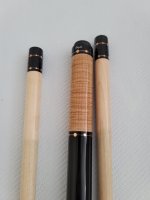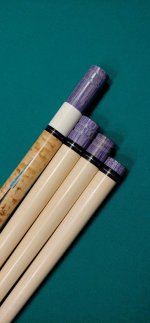the joints are the most susceptible to damage when apart in my opinion. The pin can bend, dirt can get in the threads, threads could swell and become less uniform. For the sake of 20 bucks i will throw a set on.
Now custom wise, the extra cost is more the look and enjoyment of finishing the look of a cue. I got a nicer cue, so got a set of nicer jps. I like them, so i got them. Not needed, but hey, if i can and want to spend a little more i will. I wouldn't get custom for every cue, only the ones i like.
I don't have this cohen cue anymore, and the jps came with it so i didnt pay extra, but they really were nice. Copper beads to match the ring work. I really liked how they added to the cue.
Now custom wise, the extra cost is more the look and enjoyment of finishing the look of a cue. I got a nicer cue, so got a set of nicer jps. I like them, so i got them. Not needed, but hey, if i can and want to spend a little more i will. I wouldn't get custom for every cue, only the ones i like.
I don't have this cohen cue anymore, and the jps came with it so i didnt pay extra, but they really were nice. Copper beads to match the ring work. I really liked how they added to the cue.


